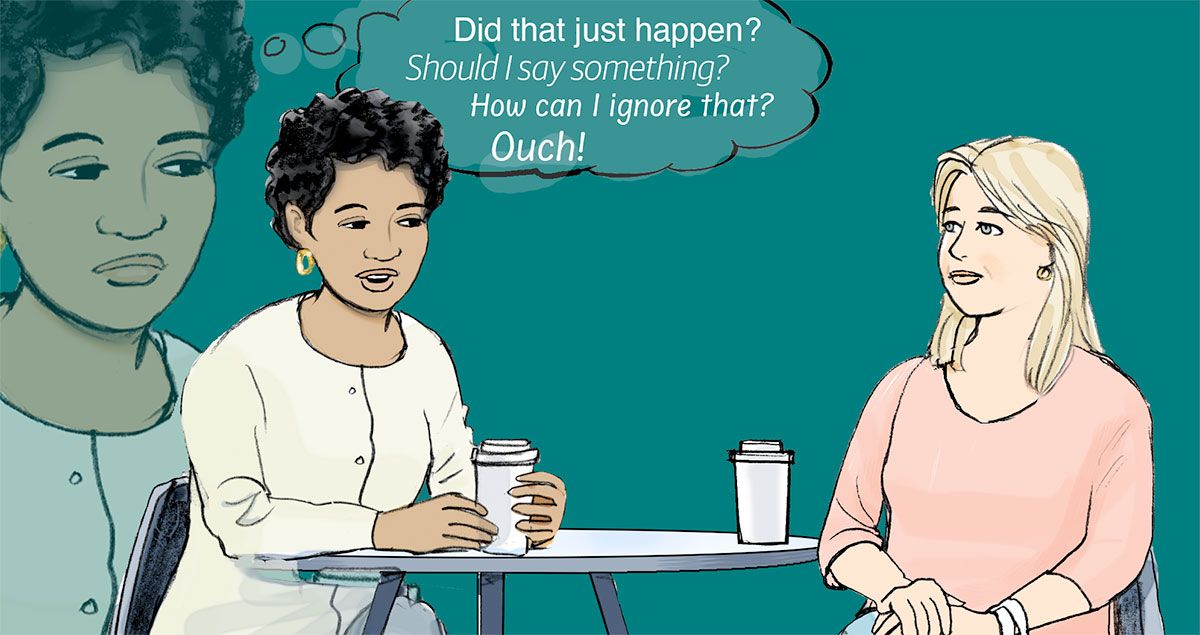Microaggressions… We have a lot to Learn

To be human is to be flawed, but our struggles have the remarkable potential to transform us. By addressing our mistakes and remaining open to learning, we broaden our understanding, increase our empathy and build our capacity to do better the next time. Such is the case with microaggressions. When these destructive slights occur, they must be disarmed and dismantled first and foremost, and therein lies a valuable opportunity for discovery and growth.
The macro impact of microaggressions
Derald Wing Sue, PhD, author of multiple books on microaggressions, multicultural psychology and racism and professor of psychology at Teachers College, Columbia University defines microaggressions as “brief, everyday exchanges that send denigrating messages to certain individuals because of their group membership.” Dr. Sue further explains that microaggressions are often accompanied by prejudicial behavior that is rationalized or explained away. While some may argue that microaggressions are small and unintentional and therefore innocent in nature, it is because of their pervasiveness and deniability – not to mention their basis in problematic power structures and repugnant stereotypes – that microaggressions can cause considerable damage.
An example of a microaggression would be when a person of color is told, “You speak English so well!” The microaggression may have been delivered with seemingly good intentions, but it carries an offensive, hidden message, i.e., that a person of color would not be expected to speak well. When the person on the receiving end reacts or when it otherwise becomes apparent that a microaggression has occurred, it’s natural for the offender to become defensive. In these instances, however, it’s important to focus on the person who was hurt and address the damage that was done even when no ill will was intended. An absence of malice does not negate the harm, and make no mistake about it, the harm can be significant.
Microaggressions have the capacity to negatively affect the mental, emotional and physical health of those on the receiving end. Over time, they create chronic stress and increase one’s vulnerability to a host of illnesses. According to research by Monnica T. Williams a board-certified licensed clinical psychologist and associate professor in the School of Psychology at the University of Ottawa, people who regularly deal with microaggressions may also experience “confusion, anger, anxiety, helplessness, hopelessness, frustration, paranoia and fear,” which may lead to “dysfunctional coping strategies, such as denial, withdrawal and substance abuse.” The good news is that, by exploring our conditioning and assumptions and by doing the work to get rid of bias, we will be less likely to inflict harm.
Preventing and mitigating microaggressions
Microaggressions reveal, and, at the same time, create inequities in our relationships. In addition to the damage done to a person’s health, microaggressions jeopardize one’s ability to thrive in the workplace. They negatively impact performance, job satisfaction and team dynamics. For these reasons, we all have a role to play in preventing and mitigating microaggressions.
To begin with, it’s important to recognize that we each have inherent biases that may cause us to commit microaggressions, which is why self-reflection and a willingness to learn are key. Ignorance and a veil of innocent intent are inadequate excuses. We must be informed and vigilant in order to create communities and workplaces that are equitable and inclusive and that promote a sense of belonging. We must examine our assumptions, stand witness to our thoughts and anticipate our impact. These skills may not necessarily come naturally, but, fortunately, they can be learned.
Knowing better so that we may do better
“I did then what I knew how to do. Now that I know better, I do better.”
-Maya Angelou
Dr. Sue partnered with SunShower Learning to create the Disarming Microaggressions e-Learning course and the 21-Day Plan. He generously shared his research and expertise, and he made personal appearances in the course during many video clips. We encourage you to check out these valuable resources to learn specific skills and tested intervention actions that can be taken to create an inclusive, respectful and productive work environment.
More to come on impact versus intention in our next email. We will interview Marsha Ross-Jackson, who’s developed a powerful presentation on why it’s important to understand the difference between intent and impact.

